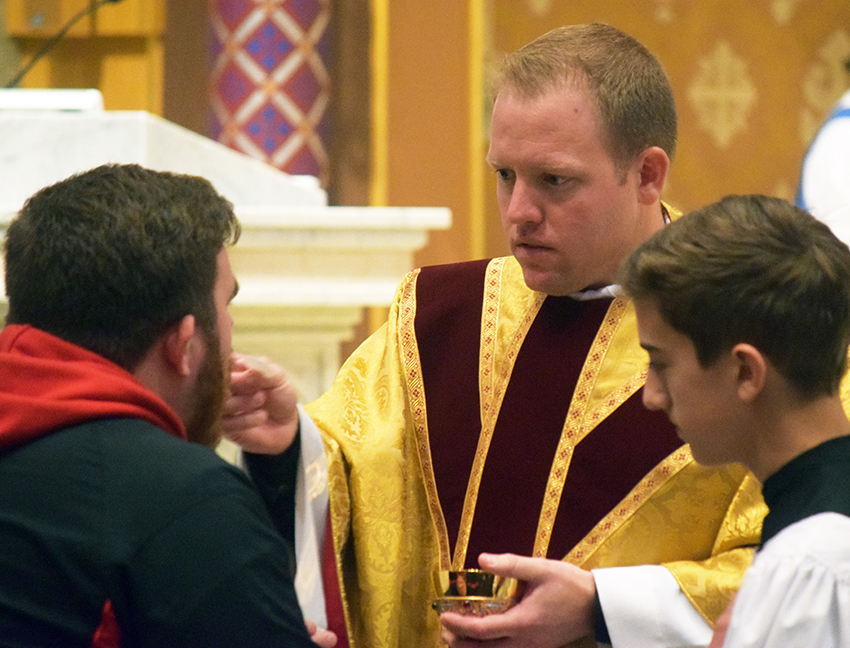Pew survey shows majority of Catholics don’t believe in the ‘Real Presence’

Father Lee Brokaw distrubutes Communion to a participant in this spring's A Call to Catholic Men of Faith, the annual men's march and Mass in Peoria. A new Pew study about the level of Catholic belief in the real presence of Jesus in the Eucharist showed that a majority of Catholics do not believe that the bread and wine used at Mass become the body and blood of Christ. (The Catholic Post file photo/Tom Dermody)
By Mark Pattison / Catholic News Service
WASHINGTON (CNS) — A new study about the level of Catholic belief in the real presence of Jesus in the Eucharist showed that a majority of Catholics do not believe that the bread and wine used at Mass become the body and blood of Christ.
The report drew a strong rebuke from Auxiliary Bishop Robert E. Barron of Los Angeles, who posted Aug. 6 on Twitter: “It’s hard to describe how angry I feel after reading what the latest @pewresearch study reveals about understanding of the Eucharist among Catholics. This should be a wake-up call to all of us in the Church.”
“This should be a wake-up call to all of us in the Church.” — Auxiliary Bishop Robert E. Barron, Los Angeles
In a video that accompanied the post, Bishop Barron’s anger is not directed at Pew, but inward. “I’m blaming myself, bishops, priests and anybody” responsible for transmitting the faith, he said. “We’re all guilty.”
He added, “It’s been a massive failure of the church carrying on its own tradition.”
ONLY “SYMBOLS” OF THE BODY AND BLOOD?
The Pew study, issued Aug. 5, showed that 69 percent of all self-identified Catholics said they believed the bread and wine used at Mass are not Jesus, but instead “symbols of the body and blood of Jesus Christ.” The other 31 percent believed in the real presence of Jesus in the Eucharist, known as transubstantiation.
“Most Catholics who believe that the bread and wine are symbolic do not know that the church holds that transubstantiation occurs,” said Gregory A. Smith, associate director of research at Pew Research Center in Washington. “Overall, 43 percent of Catholics believe that the bread and wine are symbolic and also that this reflects the position of the church.
Sixty-nine percent of all self-identified Catholics said they believed the bread and wine used at Mass are not Jesus, but instead “symbols of the body and blood of Jesus Christ.”
“Still, one in five Catholics — 22 percent — reject the idea of transubstantiation, even though they know about the church’s teaching,” Smith said.
The numbers who believe in transubstantiation are higher among Catholics who go to Mass at least once a week, but are hardly overwhelming. About five of every eight churchgoing Catholics believe in the church’s teaching of transubstantiation.
Split among the 37 percent who don’t believe that the Communion bread and wine actually become the body and blood of Christ are 23 percent who don’t know what the church’s teaching is, and 14 percent who know the church’s teaching but don’t believe it, Smith said.
According to Pew’s figures, a majority in all age groups believe the bread and wine used at Mass to be symbolic, and the majority grows larger as the age group grows younger. Catholics with a high school education or less are less likely to believe in transubstantiation, Hispanic Catholics believe in it less than whites, and women believe in it less than men.
“A BASIC TENET OF CATHOLICISM”
Bishop Barron sounded astounded by the findings. “Any Catholic worth his or her salt knows this is a central teaching,” he said in the video. “It’s a basic tenet of Catholicism.”
He said some are bound to react, “Oh, well, who cares? As long as they’re committed to the poor, or committed to social justice. Isn’t that important?” But Bishop Barron called that “a reduction of religion to morality, which is repugnant to Catholicism.”
He cited a list of saints and holy people — among them Dorothy Day, St. Katharine Drexel, Jacques Maritain and St. Vincent de Paul — whom he said had “a profound understanding and love for the Eucharist, and said if someone asked them, “Isn’t the Eucharist a nice symbol of Jesus?”, “you’d have open rebellion.”
“You take away the central teachings of our church at the doctrinal level, and trust me, you will take away our commitment to the poor,” Bishop Barron said. “It belongs together as a whole.”
– – –
EDITOR’S NOTE: The full Pew study can be found online here.





